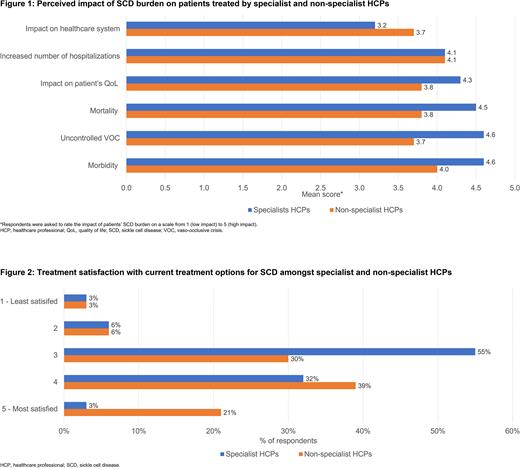Abstract
The Kingdom of Saudi Arabia (KSA) exhibits an extremely high prevalence of SCD and is regarded as one of the worst-affected countries in the world. Up to 2.6% of the population diagnosed with SCD in parts of KSA, and the Real-World Assessment Survey for SCD in Saudi (ROARS) was conducted to obtain insights on the disease landscape in the country. Here, we present data on the SCD management strategies employed by both specialist and non-specialist HCPs in KSA.
Between September and December 2021, HCPs (>2 years SCD experience, SCD load >50 patients, >50% of practice time spent treating SCD patients) completed the survey using the structured, bilingual ROARS questionnaires (English/Arabic) through personal quantitative web-assisted telephone interviews. These HCPs were asked a series of questions covering topics such as patient caseload, patient management strategies, and perceptions of SCD treatment.
A total of 64 HCPs responded to the survey, including 31 specialists (adult hematologists, n=24; pediatric hematologists, n=7) and 33 non-specialists. Non-specialist professions included general practice/family medicine/primary care (n=16), internal medicine (n=7), pediatrics (n=9), and medical oncology (n=1). On average, the monthly patient caseload was greater with specialist HCPs than non-specialist HCPs (74 vs 59 patients, respectively). Specialist HCPs were more likely to treat patients with more severe SCD genotypes: 72.3% of patients treated by specialist HCPs were diagnosed with HbSS SCD compared to 57.6% of patients treated by non-specialist HCPs.
On average, targeted family screening was performed for 82.1% of patients in the hospitals where specialist HCPs work compared to 58.6% of patients in the hospitals where non-specialist HCPs work. Patients treated by specialist HCPs were also followed-up more frequently than patients treated by non-specialist HCPs (55% vs 33% followed up with their patients three/four times a year, respectively).
Differences in the treatments received by patients were evident between HCPs; 72% of patients treated by specialists were receiving hydroxyurea compared to 44% of patients treated by non-specialists. However, no substantial differences in the proportion of patients treated by innovative therapies (L-glutamine, voxelotor, or crizanlizumab) were evident between specialists (7% of patients) and non-specialists (8% of patients).
Screening for common SCD complications occurred more frequently in patients treated by specialists than those treated by non-specialists. This was particularly evident for avascular necrosis (45% of patients vs 21% of patients), liver sequestration (29% vs 9%), pulmonary hypertension (42% vs 24%), and nephropathy/renal insufficiency (39% vs 27%). Alloimmunization was screened for in 13% of patients treated by specialist HCPs and 3% of patients treated by non-specialist HCPs; the corresponding screening rates for vision problems/retinopathy were 13% and 12%, respectively. Overall, 65% of specialist HCPs and 36% of non-specialist HCPs reported that uncontrolled vaso-occlusive crises (VOCs) had a high impact on their patients; the impact of other SCD burdens are presented in Figure 1.
Both specialist and non-specialist HCPs noted the rarity of pediatric to adult transition programs for SCD patients within hospitals; 68% of specialist HCPs and 73% of non-specialist HCPs reported no program in their treatment center. Overall, 35% of specialist HCPs reported satisfaction with current treatment options for SCD compared to 60% of non-specialist HCPs (Figure 2). Reasons for specialist HCP dissatisfaction with current SCD treatment options included the limited number of treatment options (80%), inability to reach treatment goals set for patients (55%), and inability to provide long term symptomatic relief (35%).
Differences in the management of SCD patients between specialist and non-specialist HCPs in KSA were evident in this study. Specialist HCPs perform SCD and SCD complication screening more frequently than non-specialist HCPs and follow up with their patients at more frequent intervals, highlighting the need for effective education and the implementation of clinical practice guidelines to improve patient management. These data also showcase the unmet need for transition programs, and the dissatisfaction with the capability of current treatment options to improve patients' outcomes.
Disclosures
Jastaniah:Novartis: Consultancy, Honoraria, Other: Meeting/travel support; Amgen: Consultancy, Honoraria, Other: Meeting/travel support; Elsevier: Honoraria; Roche: Consultancy, Honoraria. Al Zayed:Novartis: Honoraria, Other: Meeting/travel support. Al Darwish:Amgen: Consultancy, Honoraria, Other: Meeting/travel support; Elsevier: Honoraria; Roche: Consultancy, Honoraria; Novartis: Consultancy, Honoraria, Other: Meeting/travel support. Tarawah:Takeda: Honoraria; Novo Nordisk: Honoraria, Other: Meeting/travel support; Sobi: Honoraria, Other: Meeting/travel support; Novartis: Honoraria, Other: Meeting/travel support; Roche: Honoraria. Al Manea:Novartis: Consultancy. Alhazmi:Sanofi: Consultancy, Honoraria; Novartis: Consultancy, Honoraria. Alzahrani:MSD: Honoraria; Novartis: Consultancy, Other: Meeting/travel support; GILEAD: Other: Meeting/travel support. Soliman:Novartis: Current Employment. Askar:Novartis: Current Employment. Almustafa:Novartis: Current Employment.
Author notes
Asterisk with author names denotes non-ASH members.


This feature is available to Subscribers Only
Sign In or Create an Account Close Modal